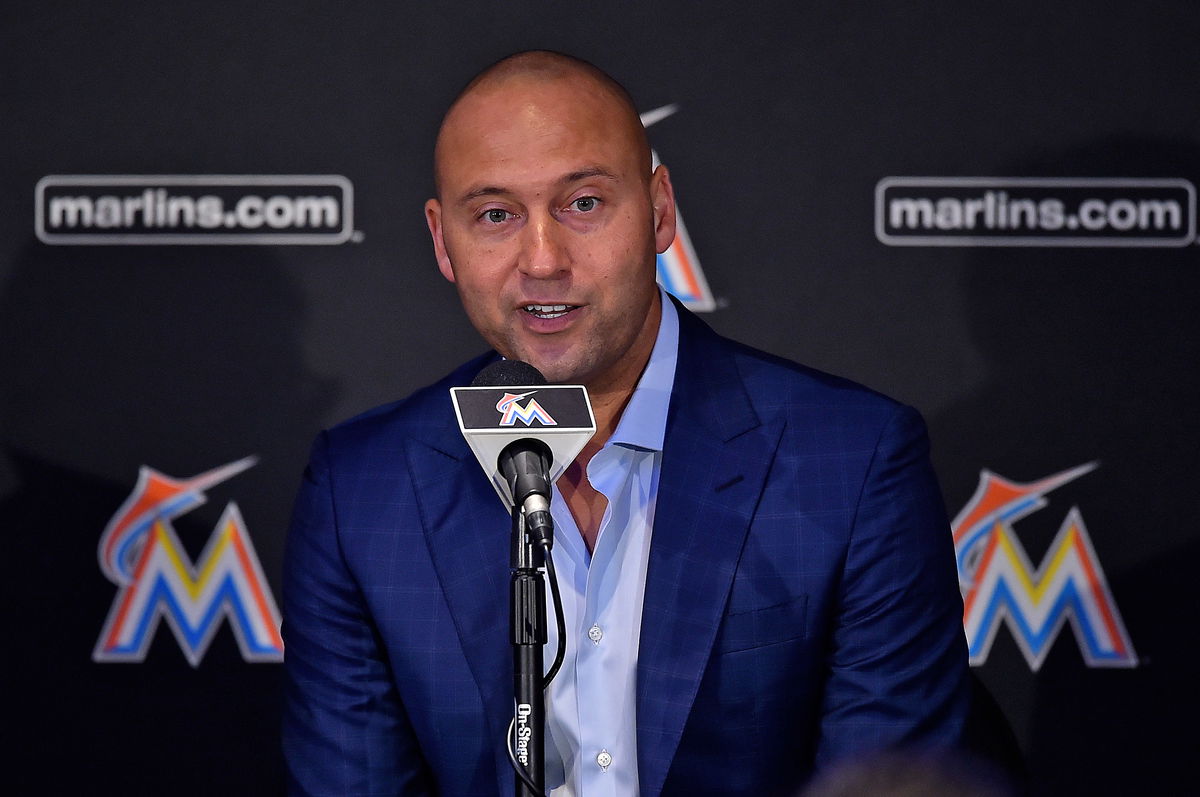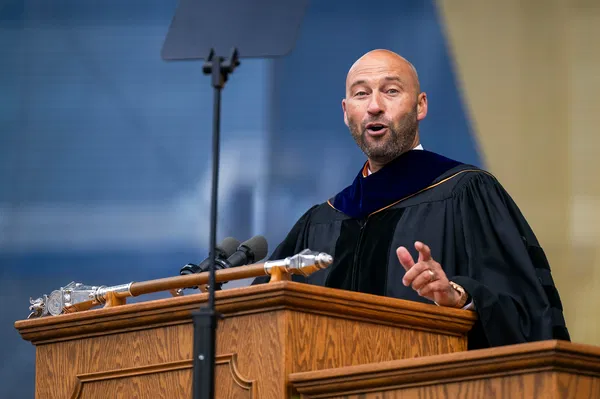

When legends trade pinstripes for power suits, the results aren’t always Hall of Fame material. Derek Jeter found that out the hard way in Miami, where the Marlins have somehow managed to lose games, direction, and now, patience. Once hailed as baseball royalty, Jeter’s executive stint has become a case study in how not to rebuild. Even the people who once defended the franchise are now sharpening their knives—and pointing them squarely at him.
Watch What’s Trending Now!
Derek Jeter was a great baseball player, and there is no doubt, but his time as the CEO of the Miami Marlins, an absolute disaster. At least that is what the numbers and former president of the Miami Marlins, David Samson, are trying to tell us.
In his recent video, David Samson talked about how Derek Jeter mismanaged the Marlins when he was there and how the effects can be seen even now. He said, “I don’t miss an opportunity to miss an opportunity criticizing Derek Jeter. Well, now that he’s gone and fired because he was the most ineffective executive almost in the history of franchise executives.”
ADVERTISEMENT
It’s certainly not his first time criticising Jeter. Back in 2023, he said, “And after four years, I think he realized that being a shortstop and being an executive are two totally different things. … And I think he realized quickly that being a pitchman for Subway was probably going to be more up his alley than running the team every day and being accountable for that.”
Derek Jeter walked into the Marlins’ front office with pinstripe prestige and championship rings. What he left behind was a stripped-down franchise with little direction and even less talent. His tenure as CEO wasn’t just bumpy—it derailed the organization’s entire rebuild. The legend’s executive career became a cautionary tale rather than a model to follow.
Jeter’s reign began with a fire sale that torched the fanbase’s hopes overnight. Trading away stars like Giancarlo Stanton, Christian Yelich, and Marcell Ozuna gutted a once-promising core. The moves were called strategic, but the results were disastrous—losses piled up, and attendance cratered. Miami quickly became irrelevant both on the field and off.
ADVERTISEMENT

ADVERTISEMENT
Off the field, Jeter made bizarre aesthetic decisions while ignoring deeper structural flaws. He spent money removing the iconic home run sculpture instead of improving the roster. Under his leadership, payroll was slashed, and scouting pipelines stagnated. His VP hire, Gary Denbo, created tension and was later fired after Jeter’s exit.
Now, with Jeter gone, the Marlins are left holding a blueprint full of holes. Their best prospects are teenagers, meaning success is still years away. Former team president David Samson called Jeter’s regime worse than his own—and fans agree. The franchise still hasn’t recovered from the damage done by its most famous shortstop.
ADVERTISEMENT
The blueprint Derek Jeter left behind wasn’t just flawed—it was practically drawn in invisible ink. For someone who made a career out of delivering in the clutch, his front-office at-bats were all swings and misses. Miami didn’t just lose games—they lost years. And while legends never die, their executive reputations can certainly take a beating. The Marlins wanted a captain; they got a ghost ship.
The rebuild since the Derek Jeter era has not gone well for the Marlins
For a franchise that once had a fish for a logo and a revolving door for a roster, the Miami Marlins have mastered the art of saying nothing while doing less. Fans aren’t asking for miracles—just a little honesty. But when transparency is treated like a luxury item and commitment gets traded for prospects, you start to wonder if Bruce Sherman and the front office even remember who they’re building this for.
ADVERTISEMENT
The Miami Marlins are stuck in a cycle of hope, hype, and heartbreak. Since 2003, competitiveness has come in blips, not waves. Playoff runs in 2020 and 2023 teased promise, then vanished without a trace. Fans are left cheering for a team that seems unsure of its own direction.
Missteps have become part of the Marlins’ identity. Kim Ng built a team that made the playoffs, then was abruptly discarded. Peter Bendix arrived with silence instead of strategy. The rebuild began, but no one told the people paying to watch it.
Top Stories
Framber Valdez Hit With Harsh Reality Check as Orioles, Blue Jays Lock Horns In Heated Battle

Brian Cashman Distances Himself from Yankees’ Offseason Outcome with $162M Hal Steinbrenner Verdict

Mets Nation Demands Carlos Mendoza’s Ouster After Fresh Clubhouse Rift Blamed for 2025 Collapse

“Greedy” Phillies’ Bo Bichette Miss Continues to Haunt as Dave Dombrowski Draws Blunt Criticism

Max Scherzer’s “Unfinished Business” Sends Clear Signal to Blue Jays After Honest Plea to All 30 MLB Teams

Promises are made, then quietly abandoned. Management said free agency would be active, then ghosted the market. A Sandy Alcantara trade looms, despite fan loyalty being loud and clear. When words don’t match actions, fans stop listening altogether.
ADVERTISEMENT
If communication were currency, the Marlins would still be shopping in the bargain bin. Fans aren’t just spectators—they’re stakeholders, and they deserve more than cryptic rebuilds and hollow promises. Transparency isn’t a threat; it’s the bare minimum. If Bruce Sherman truly wants sustainable success, he might start by sustaining some trust. Otherwise, the only thing left to fill seats will be frustration.
ADVERTISEMENT
ADVERTISEMENT
ADVERTISEMENT